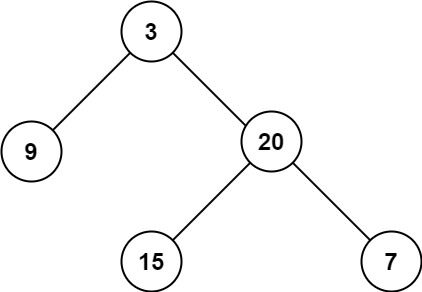| comments | difficulty | edit_url | tags | ||||
|---|---|---|---|---|---|---|---|
true |
简单 |
|
给定一个二叉树 root ,返回其最大深度。
二叉树的 最大深度 是指从根节点到最远叶子节点的最长路径上的节点数。
示例 1:
输入:root = [3,9,20,null,null,15,7] 输出:3
示例 2:
输入:root = [1,null,2] 输出:2
提示:
- 树中节点的数量在
[0, 104]区间内。 -100 <= Node.val <= 100
递归遍历左右子树,求左右子树的最大深度,然后取最大值加
时间复杂度
# Definition for a binary tree node.
# class TreeNode:
# def __init__(self, val=0, left=None, right=None):
# self.val = val
# self.left = left
# self.right = right
class Solution:
def maxDepth(self, root: TreeNode) -> int:
if root is None:
return 0
l, r = self.maxDepth(root.left), self.maxDepth(root.right)
return 1 + max(l, r)/**
* Definition for a binary tree node.
* public class TreeNode {
* int val;
* TreeNode left;
* TreeNode right;
* TreeNode() {}
* TreeNode(int val) { this.val = val; }
* TreeNode(int val, TreeNode left, TreeNode right) {
* this.val = val;
* this.left = left;
* this.right = right;
* }
* }
*/
class Solution {
public int maxDepth(TreeNode root) {
if (root == null) {
return 0;
}
int l = maxDepth(root.left);
int r = maxDepth(root.right);
return 1 + Math.max(l, r);
}
}/**
* Definition for a binary tree node.
* struct TreeNode {
* int val;
* TreeNode *left;
* TreeNode *right;
* TreeNode() : val(0), left(nullptr), right(nullptr) {}
* TreeNode(int x) : val(x), left(nullptr), right(nullptr) {}
* TreeNode(int x, TreeNode *left, TreeNode *right) : val(x), left(left), right(right) {}
* };
*/
class Solution {
public:
int maxDepth(TreeNode* root) {
if (!root) return 0;
int l = maxDepth(root->left), r = maxDepth(root->right);
return 1 + max(l, r);
}
};/**
* Definition for a binary tree node.
* type TreeNode struct {
* Val int
* Left *TreeNode
* Right *TreeNode
* }
*/
func maxDepth(root *TreeNode) int {
if root == nil {
return 0
}
l, r := maxDepth(root.Left), maxDepth(root.Right)
return 1 + max(l, r)
}/**
* Definition for a binary tree node.
* class TreeNode {
* val: number
* left: TreeNode | null
* right: TreeNode | null
* constructor(val?: number, left?: TreeNode | null, right?: TreeNode | null) {
* this.val = (val===undefined ? 0 : val)
* this.left = (left===undefined ? null : left)
* this.right = (right===undefined ? null : right)
* }
* }
*/
function maxDepth(root: TreeNode | null): number {
if (root === null) {
return 0;
}
return 1 + Math.max(maxDepth(root.left), maxDepth(root.right));
}// Definition for a binary tree node.
// #[derive(Debug, PartialEq, Eq)]
// pub struct TreeNode {
// pub val: i32,
// pub left: Option<Rc<RefCell<TreeNode>>>,
// pub right: Option<Rc<RefCell<TreeNode>>>,
// }
//
// impl TreeNode {
// #[inline]
// pub fn new(val: i32) -> Self {
// TreeNode {
// val,
// left: None,
// right: None
// }
// }
// }
use std::cell::RefCell;
use std::rc::Rc;
impl Solution {
fn dfs(root: &Option<Rc<RefCell<TreeNode>>>) -> i32 {
if root.is_none() {
return 0;
}
let node = root.as_ref().unwrap().borrow();
1 + Self::dfs(&node.left).max(Self::dfs(&node.right))
}
pub fn max_depth(root: Option<Rc<RefCell<TreeNode>>>) -> i32 {
Self::dfs(&root)
}
}/**
* Definition for a binary tree node.
* function TreeNode(val, left, right) {
* this.val = (val===undefined ? 0 : val)
* this.left = (left===undefined ? null : left)
* this.right = (right===undefined ? null : right)
* }
*/
/**
* @param {TreeNode} root
* @return {number}
*/
var maxDepth = function (root) {
if (!root) return 0;
const l = maxDepth(root.left);
const r = maxDepth(root.right);
return 1 + Math.max(l, r);
};/**
* Definition for a binary tree node.
* struct TreeNode {
* int val;
* struct TreeNode *left;
* struct TreeNode *right;
* };
*/
#define max(a, b) (((a) > (b)) ? (a) : (b))
int maxDepth(struct TreeNode* root) {
if (!root) {
return 0;
}
int left = maxDepth(root->left);
int right = maxDepth(root->right);
return 1 + max(left, right);
}